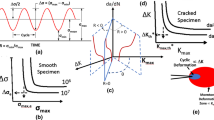Abstract
The paper deals with the strain energy consumed in fatigue failure under sinusoidal loading. The damage stress is considered, and it is shown that an energy formulation can be given for the traditional interpretation of the fatigue test results. That approach is used in determining the position of the French line, which it is suggested should be taken as the end of the crack initiation stage. The French line is constructed from the same data as used for constructing the fatigue curve.
Similar content being viewed by others
References
H. French, “Fatigue and hardening of steel,” Trans. Am. Soc. Steel Treat.,21, 899 (1933).
G. V. Tsybanev, “An energy model for fatigue in estimating fatigue resistance characteristics in regular and block cyclic loading, ” in: Abstracts for the All-Union Conf. on Improvements in Technical Use of Ships' Hulls [in Russian], Sudostroenie, Leningrad (1989), pp. 194–195.
G. V. Tsybanev, “A phenomenological model for fatigue in metals that incorporates the change in fatigue limit during loading,” in: Abstracts for the Conference on the Dynamics and Strength of Mobile Machines [in Russian], Kutais. Politekhn. Inst., Kutaisi (1990), pp. 53–54.
V. Y. Troshchenko, L. A. Khamaza, and G. V. Tsybanev, Rapid Methods of Determining Metal Fatigue Limits on the Basis of Energy and Strain Criteria [in Russian], Naukova Dumka, Kiev (1979).
V. T. Troshchenko, L. A. Khamaza, and G. V. Tsybanev, “Research on inelastic cyclic strain and fatigue in metals,” Probl. Prochn., No. 6, 3–9 (1976).
Methodological Recommendations MR 15-81: Strength Calculations and Tests: Methods of Rapid Determination of Fatigue Limit Based on Strain Criteria [in Russian], VNIIMash, Moscow (1981).
V. T. Troshchenko, Fatigue and Inelasticity in Metals [in Russian], Naukova Dumka, Kiev (1971).
V. T. Troshchenko, “A criterion for fatigue strength in metals and alloys based on energy dissipation,” in: Energy Dissipation in System Vibrations [in Russian], Naukova Dumka, Kiev (1966), pp. 168–177.
W. Weibull, Fatigue Tests and Result Analysis [Russian translation], Mashinostroenie, Moscow (1964).
I. A. Oding, Dislocation Theory for metals with Applications [in Russian], Izd. AN SSSR, Moscow (1959).
W. Weibull, “A statistical representation of fatigue failure of solids,” Trans. Royal Inst. Tech., Sweden (1949), No. 27.
V. S. Ivanova and V. F. Terent'ev, The Nature of Metal Fatigue [in Russian], Metallurgiya, Moscow (1975).
S. Kotsanda, Fatigue Failure in Metals [Russian translation], Metallurgiya, Moscow (1976).
M. Hempel, “Shearing bands, twinning, and particle segregation under alternating loads,” in: Fatigue and Fatigue Resistance in Metals [Russian translation], Izd. Inostr. Lit., Moscow (1963).
V. P. Kogaev, Strength Calculations for Time-Varying Stresses [in Russian], Mashinostroenie, Moscow (1977).
V. S. Ivanova, T. S. Mar'yanovskaya, and V. F. Terent'ev, “A rapid method of constructing the French line with the use of energy fatigue criteria,” Zavod. Lab., No. 2, 225–228 (1966).
Author information
Authors and Affiliations
Additional information
Translated from Problemy Prochnosti, No. 2, pp. 19–27, February. 1994.
Rights and permissions
About this article
Cite this article
Tsybanev, G.V. An energy approach to fatigue tests and crack initiation stage determination. Strength Mater 26, 103–109 (1994). https://doi.org/10.1007/BF02209324
Received:
Issue Date:
DOI: https://doi.org/10.1007/BF02209324




